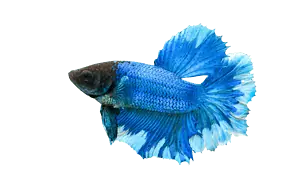Sometimes betta fish struggle with digesting their food and passing waste.
When food builds up in their body, it causes symptoms of swim bladder disease.
If left untreated, constipation in betta fish turns deadly.
Learning to recognize and treat the symptoms quickly may save your betta’s life.
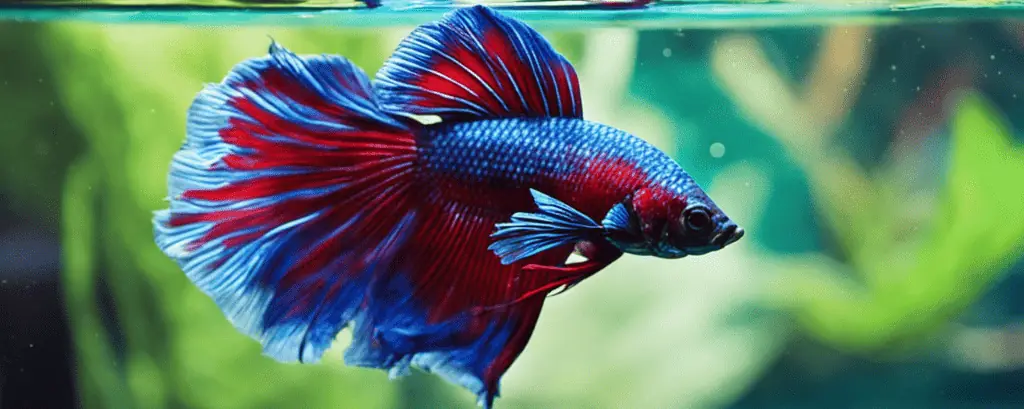
Table of Contents
What Causes Constipation in Betta Fish?
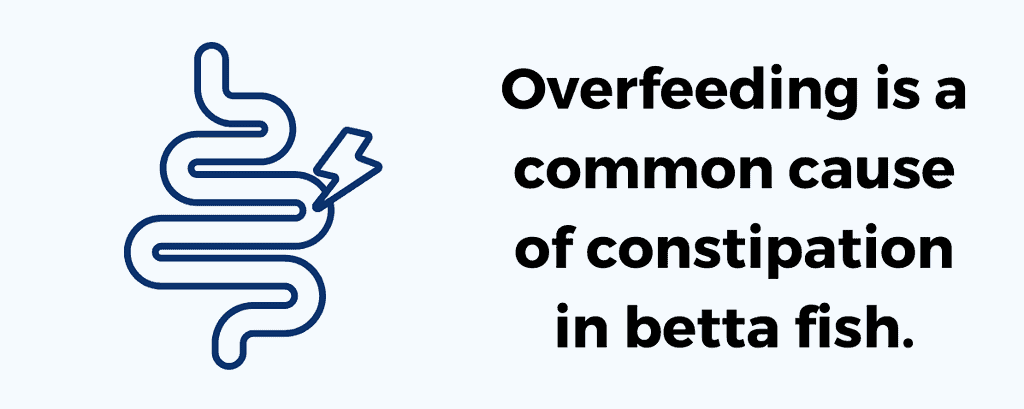
There are several reasons betta fish might get constipated:
- Overfeeding
- Poor diet
- Poor water conditions
- Parasites or other illness
One of the most common causes of constipation in betta fish is overfeeding.
When your betta eats too much food, it overwhelms its system. Their stomach can’t keep up.
Overfeeding is a huge problem if your betta doesn’t get a high-fiber diet. Fiber helps break down food in your betta’s stomach.
Lack of Variety

In fact, this leads us to the second cause of constipation: poor diet. We hear all the time how betta fish need a high-protein diet to stay healthy.
This is absolutely true! But they also need a varied diet.
Freeze-dried foods are a staple for betta owners and generally contain valuable fiber.
These are fed in addition to the usual betta pellet foods. Replace the pellet meal a couple of times a week with freeze-dried shrimp or daphnia.
Live foods are another great way to add some variety to their diet!
They encourage your betta’s hunting instincts and do great things for the digestive tract.
These are functional meal replacements a couple of times a week.
On top of these treats, be sure to purchase high-quality betta pellets.
Lack of Exercise
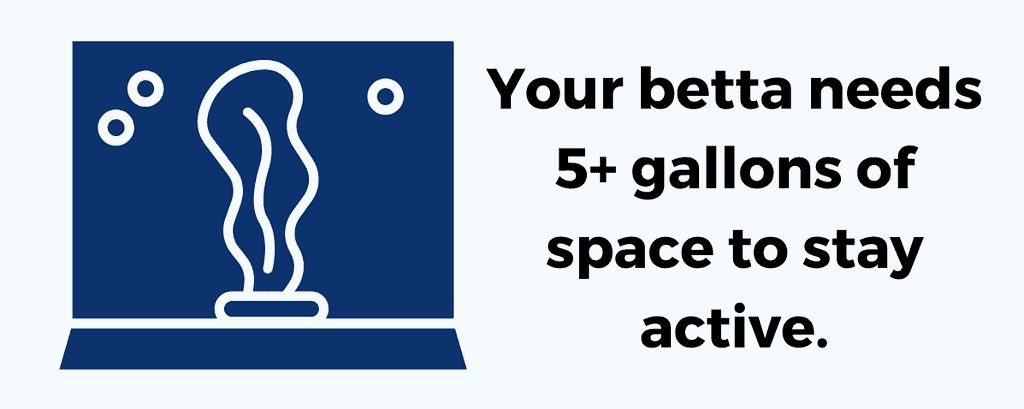
Another reason your betta may struggle to pass waste is lack of exercise.
This is a more common problem in betta fish with too small of a tank.
Your betta needs 5 gallons of space to stay active and comfortable.
While they love a densely planted tank, they also need room to swim through everything.
Add lots of decor to encourage your betta to get curious and move around their environment.
Inadequate Water Conditions
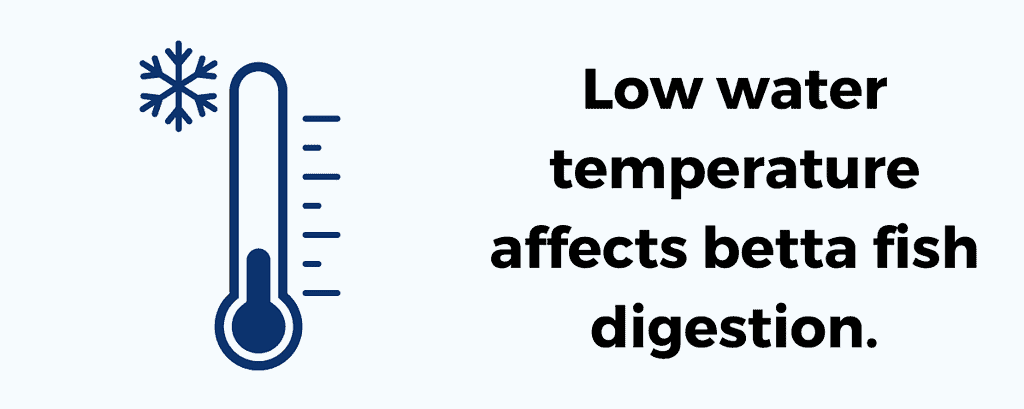
It may sound counterintuitive, but a poor environment can cause constipation issues for your betta.
Low water temperature causes difficulty with digestion, as do stress and shock.
Sudden changes in pH, temperature, ammonia levels, or oxygen impact your pets.
Ammonia spikes cause various serious health conditions in betta fish, from fin rot to Swim Bladder Disease (SBD).
SBD sometimes starts with constipation and sometimes causes it.
Parasites or Other Illnesses

Certain health issues cause food blockages in betta fish as well. The most common disorders to do are parasites and SBD.
Betta fish get parasites when they consume a host.
This may happen when you give them live food or add infected snails or shrimp to the tank.
There are almost always visible signs when a betta gets a parasitic infection. Some make white cysts on the outside of the betta’s body.
Parasitic worms can protrude from the betta’s stomach.
It’s horrifying, but at least you know what’s causing the poor betta’s symptoms.
Signs and Symptoms of Constipation
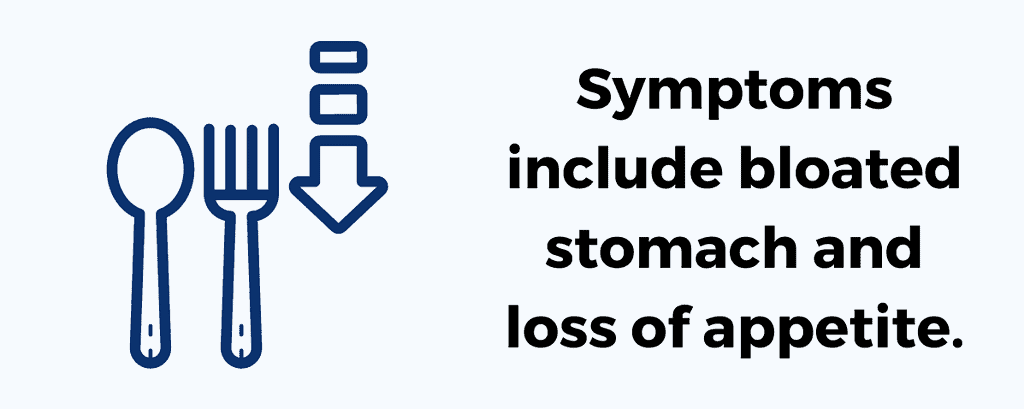
What To Look For
Constipation is more than simply the inability to pass waste. It causes many symptoms in betta fish and may eventually become fatal.
Here’s a complete list of potential symptoms:
- No bowel movements
- Bloated stomach
- Loss of appetite
- Difficulty swimming
- Hardened, pale, or stringy feces
- Lethargy
- Swimming sideways or upside down
- Floating or sinking
It is highly unlikely you will see only one of these symptoms.
Say your betta has a bloated or swollen stomach. Sometimes this is a sign of constipation, but sometimes it’s a sign of dropsy.
The treatment for these two health conditions is very different!
Look for a combination of the listed symptoms to ensure you’re dealing with constipation.
Progression of Symptoms

Your betta won’t be fine one day and display all these signs the next.
You’ll likely see the illness progress over a few days or longer.
Constipation usually starts with appetite changes and trouble passing waste.
You may begin to see hardened feces, a sign that your betta needs some fiber.
If you catch these symptoms and intervene immediately, you may avoid more severe constipation issues.
Otherwise, you might see stringy poop and a visibly bloated belly.
Healthy betta feces are small, round, and tan or brown. Pale, soft, excessively hard, or stringy feces are all signs of illness.
Knowing what healthy poops look like helps ensure you’ll recognize digestive health issues more quickly.
Abnormal behaviors start up shortly after that.
When your betta has trouble swimming, swims in an unusual pattern or position, and begins to float or sink, the situation is more dire.
These are signs of Swim Bladder Disorder and indicate your betta needs immediate treatment.
If the problem remains unaddressed, your betta could enter the vertical death hang and pass away.
Preventing Constipation in Betta Fish
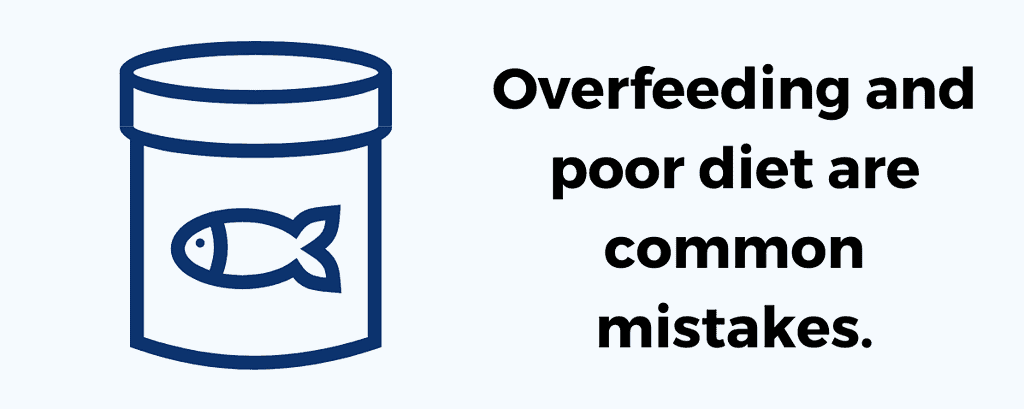
If you’re reading this article before your betta has had any trouble with constipation, nice work! You’re ahead of the curve.
Prevention is vital for all kinds of illnesses, but especially for constipation. This is because overfeeding and poor diet are such common mistakes for beginner betta keepers.
A startling number of fish keepers out there don’t know their fish need a specific temperature, pH, and other water conditions.
Here’s a list of prevention methods to start us off:
- Feed appropriate portions
- Offer a varied diet
- Encourage exercise
- Maintain optimal water conditions
- Regular check-ups
A Balanced Diet

To avoid overfeeding your betta, follow this rule of thumb:
Your betta’s meal must only be as much as they can eat in 3-5 minutes.
After this point, you must remove excess food to prevent water pollution.
Some people give their betta one day per week of fasting. This allows their system to catch up and is a great tactic for preventing problems with the digestive tract.
It’s also crucial you feed more than just pellets or flakes.
Get reliable sources of protein and fiber into your betta’s daily or weekly regimen.
This means feeding freeze-dried, live, and pellet foods. The variety ensures your betta will get all the essential nutrients they need to stay healthy and active.
Be very careful where you purchase any live food for them. Live food sometimes carries parasites or bacteria into the tank.
Consistent Exercise

Exercise is critical to keep your betta’s system functioning as it should.
Some betta fish are naturally more or less active than others. But it’s important to encourage activity wherever possible.
There are several ways to do this:
- Use exercise mirrors
- Play with them!
- Get a bigger tank
- Lots of decor
A very popular means of exercise for bettas is to use exercise mirrors.
When your betta sees their reflection, it may begin to flare and chase the mirror. This is exciting for them and gets them moving.
Here’s a floating exercise mirror we like on Amazon. Simply put it in the tank for about 5 minutes every day or two.
This is not the only way to play with your betta. Using dry-erase markers or post-it notes on the outside of the tank helps too!
These things work because your betta gets curious and excited. It may also help you forge a stronger relationship with them.
Finally, ensure your betta has at least 5 gallons of well-decorated space to move in.
Plants and decor encourage your betta to explore, especially if you switch out different decor pieces from time to time.
Maintaining Water Conditions
Here’s a table displaying the optimal water conditions for your betta fish:
Ideal Water Parameters for a Betta Fish Tank Include the following:
- Temperature: 78-80° degrees Fahrenheit (25.5-27° C)
- pH: 6.5-7.5
- Ammonia and Nitrite: 0 ppm
- Nitrate: < 40 ppm
- gH: 3-4 dGH (50-66.7 ppm)
- kH: 3-5 dKH (53.6-89.4 ppm)
- Minimum Tank Size: 5 Gallons
Keeping the water within these parameters at all times is critical to your betta’s health and comfort.
Not only do you need to aim for these ranges. You also need to ensure the temperature and pH don’t fluctuate much.
Even if they stay within the desired range, too much fluctuation harms your betta.
Avoid ammonia spikes and other problems by keeping up with your weekly 20-25% water changes.
If you’d like to know more about how to maintain good water quality, read our article at the provided link.
Treatment for Constipation in Betta Splenden
Once your betta becomes constipated, you have a few different options for treatment. Most of these things are easy enough for you to do at home.
Note: If your betta’s problem is already severe, skip the DIY solutions and go straight to the nearest fish-savvy veterinarian.
Otherwise, here are some solutions to use on your betta:
- Fasting
- Feeding extra fiber
- Epsom salt bath
- Treat underlying disease
- Consult a veterinarian
Diet Control
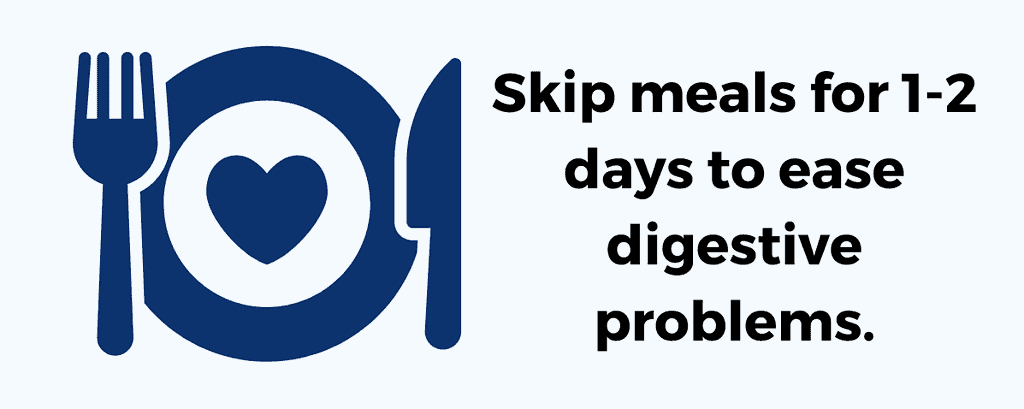
Fasting your betta is a quick fix when we catch digestive tract problems early on.
This is easy enough as you only have to skip meals for 1-2 days.
It is important, though, to move your betta to a quarantine tank if they have any tank mates. This way, your shrimp, snails, or other pets still get their daily portions.
Alternatively, you might choose to add a strong source of fiber to their diet. This only works if your betta is not yet refusing to eat.
Some excellent sources of fiber include:
- Mysis shrimp
- Opossum shrimp
- Peas
- Daphnia
- High-fiber commercial food
A lot of pellets prioritize protein over fiber. But some treats and supplements are on the market with high fiber content.
We like this product specifically designed to help with digestive health and has lots of fiber.
Epsom Salt Baths
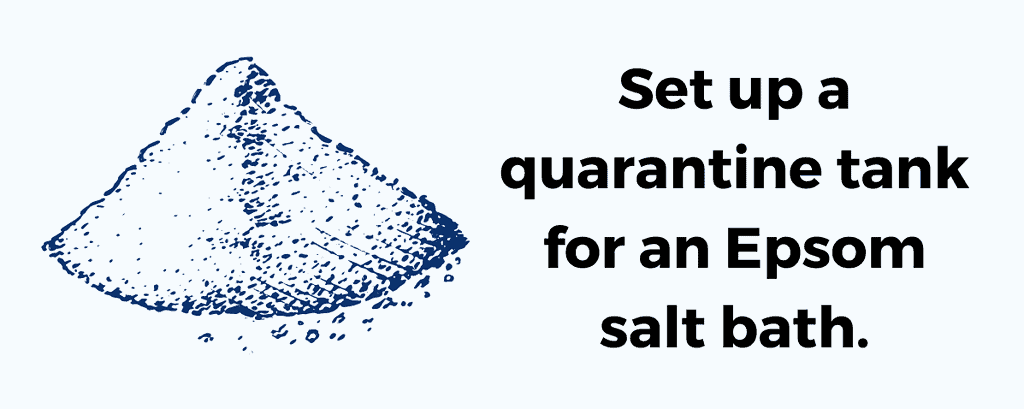
You need to set up a quarantine tank to give your betta an Epsom salt bath. It does not have to be 5 gallons like the standard tank.
Ensure the temperature, pH, and other water conditions are met before adding the fish.
Otherwise, their system could be shocked, making matters worse.
Simply add 1 tablespoon of Epsom salt per gallon of water. Your fish goes in this solution for between 5-8 minutes.
This treatment method is also good for parasites and fungal infections. This is important because if your betta has parasites, it does no good to treat only their constipation.
You must address the underlying disorder for your fish to get better.
If you aren’t sure what the cause of the problem is, consult an expert.
Ask a Veterinarian
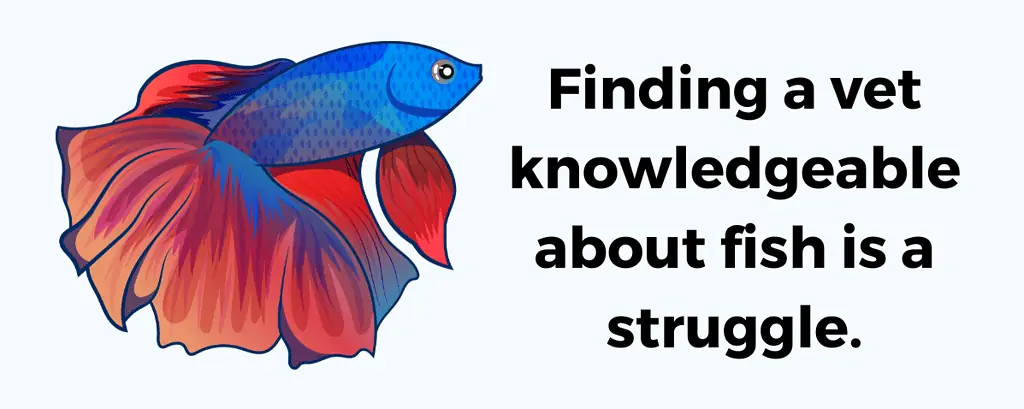
It’s tough to reach out to an expert for help. But remember how common of a problem constipation is for betta fish!
While there are things you might do to prevent it, this doesn’t mean you need to be hard on yourself. You’ll do better in the future.
The biggest struggle with consulting a veterinarian is finding one who knows about fish.
Many veterinarian offices focus more on cats, dogs, and sometimes small pets.
Aquatic pets are a little harder to find treatment for. We encourage you to consider this before you find yourself needing help.
Even if it’s a bit of a drive, ensure you know a good vet where your betta can go in a pinch.
Having an outside perspective is extremely helpful!
You only know what you know; a vet can give you personalized advice and save your betta’s life.
The Importance of Treating a Constipated Betta
Constipation is an unfortunately common health concern in betta fish. But prevention is as simple as providing a good diet and being careful not to overfeed your pet.
Once your betta is already constipated, the most important thing is to act quickly.
It doesn’t take long for the condition to get worse. Further health complications include SBD and eventually death.
You must take control of the situation as soon as you recognize what’s happening. Your betta will thank you.
If you think your betta is sick in another way, here’s our article on the most common betta fish diseases and how to treat them.

